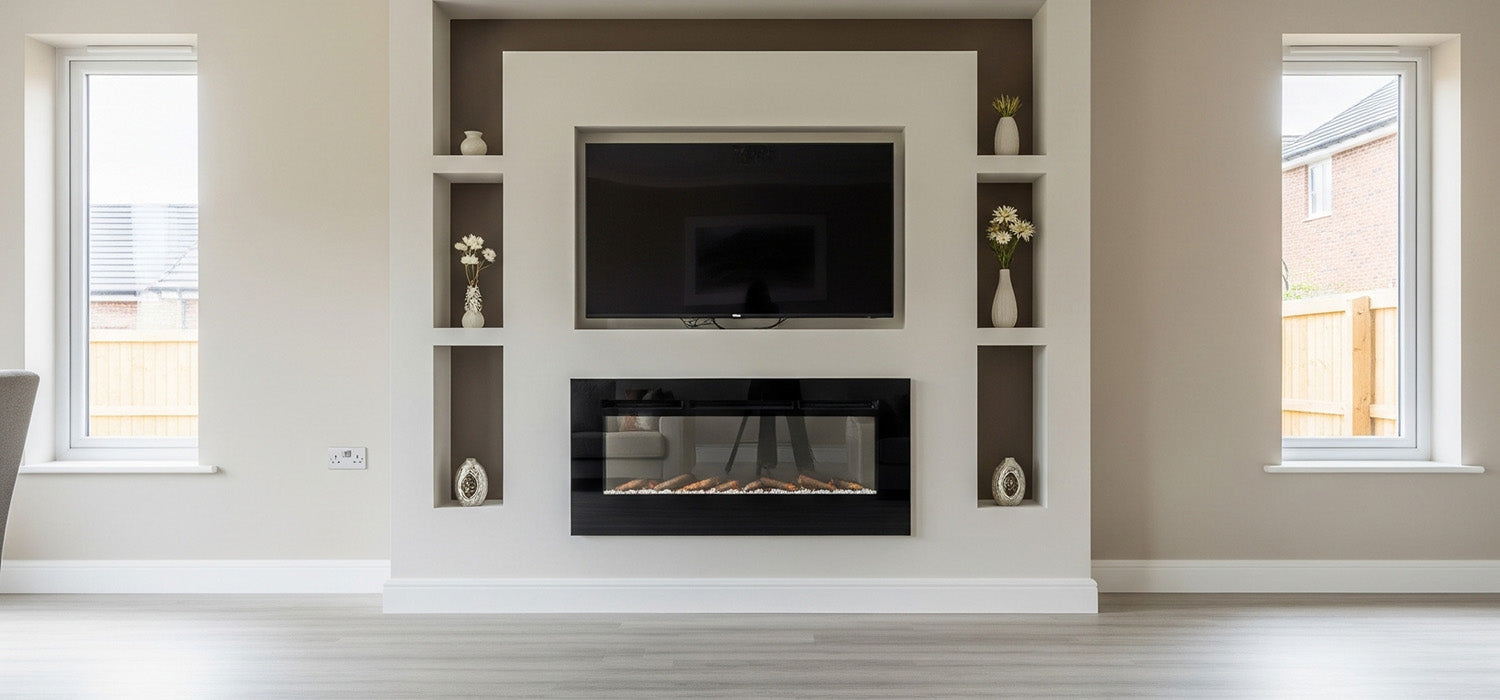
Can You Build a Media Wall in a Council House? A Practical Guide
Yes, you can build a media wall in a council house—just not without a few hoops to jump through! From landlord rules to load-bearing walls (and that dreamy Media Wall Fire setup), we’ve got the essentials covered. Want the full scoop without burning your fingers? Keep reading.
Understanding Council House Modification Rules
Media walls might be trending, but in council properties, they come with red tape. Before you start designing your living room masterpiece, it’s crucial to understand what you’re allowed to do—and what could land you in hot water.
Let’s dive into the fine print of your tenancy agreement, the council’s rulebook, and the right way to go about getting approval.
Tenancy Agreement Clauses
Your tenancy agreement holds the key to your home improvement dreams—or restrictions. It's the legal document that outlines what modifications you can make in your property.
And yes, mounting a Media Wall Fire or drilling into walls can count as a serious change. Always check for clauses that cover alterations or “structural work.” You may be surprised how much needs permission first.
What Constitutes a "Structural Alteration"
Structural alterations include any changes that affect the physical framework of the building. That means drilling into brick, adding electrical components, or even installing built-in furniture.
If it’s permanent, heavy, or changes how the building functions—there’s a good chance it’s classed as structural.
Permission Requirements for Fixed Installations
If your media wall is going to be fixed to the wall—especially with brackets or cable routing—permission is usually a must.
Even something as simple as a wall-mounted shelf can require approval in some cases. The key is to treat fixed installations seriously and always ask before you act.
Seeking Permission from Your Local Council/Housing Association
Now, don’t panic—this doesn’t mean your dream media wall is out of reach. Councils and housing associations do grant permission, but only if you follow the right steps.
The Application Process
Most councils will ask you to submit a written proposal. This might be through a form, or an email depending on how your local housing body operates.
Expect to wait a few weeks for approval. But it’s far better than having to remove the whole thing later!
What Information You'll Need to Provide
Here’s what to include when you apply:
-
A clear description of the media wall
-
Diagrams or a mock-up (don’t worry, it doesn’t need to be fancy)
-
Details of materials used
-
Confirmation of who’s doing the work (DIY or professional)
-
Electrical plans, if relevant
The more detail you give, the better your chances.
Potential Consequences of Unauthorised Works
We get it—you’re keen to get started. But trust us, skipping permission isn’t worth the risk.
Breach of Tenancy Agreement
Going ahead without consent can put you in breach of your tenancy. That might mean warnings, fines, or even legal action.
It’s not worth it for the sake of a quicker install.
Requirement to Remove or Rectify
Even worse, you could be ordered to remove the media wall and pay to fix any damage. That’s your time, money, and TV wall down the drain.
What Kind of Media Wall Can You Build?
Here’s where things get exciting. Yes, you can still build something impressive—if you choose the right style and structure.
Let’s explore your options.
Non-Permanent vs. Permanent Structures
Rule of thumb? If it can leave with you when you move, it's generally safe. If it’s built-in or fixed, you’ll likely need approval.
Freestanding Units (Generally Permitted)
Freestanding TV units, cabinets, or display stands are a great option. They don’t touch the walls, and you can find some stunning designs on the high street or online.
Bonus? No drilling, no fuss.
Wall-Mounted Shelving (Often Permitted with Caution)
If you’re planning light wall shelves to hold your speakers or Sky box, councils may allow it—with caution. Use plasterboard-friendly fixings and avoid heavy items.
Again, ask first.
Built-in Framed Media Walls (Likely Require Permission)
Dreaming of a flush-fit media wall with built-in lighting, cupboards, and that toasty Media Wall Fire? You’ll need written permission for that setup.
It’s gorgeous, yes—but councils want to ensure safety and structure aren’t compromised.
Avoiding Structural Alterations
If you want to avoid the application process altogether, you’ll need to be clever with your build.
Not Drilling into Load-Bearing Walls without Consent
These walls do the heavy lifting—literally. Avoid drilling into them without a structural assessment and council approval.
Stick to internal partition walls where possible.
Avoiding Changes to Electrical Systems
Running cables inside walls or adding new sockets? That’s electrical work and must be carried out by a qualified electrician—with council approval to match.
Practical Tips for Building in a Council Property
With the right approach, you can build a smart, stylish media wall that won’t upset the housing officer.
Minimising Damage and Ensuring Reversibility
The golden rule? Leave no trace.
Using Fewer Fixings
Keep holes small and use as few screws as possible. Command strips and clever clips can go a long way.
Choosing Materials that are Easy to Remove
Opt for panels or units that can be unscrewed in minutes. If it looks temporary, it’s more likely to be approved—or forgiven!
Documenting Your Work
Protect yourself by documenting everything.
Photos Before and After
Take clear photos before you start and once it’s all in place. These can be helpful if questions are raised down the line.
Keeping Records of Communications with the Council
Emails, forms, permission slips—keep them all safe. You’ll thank yourself later.
Adhering to Safety Standards
Your media wall should be more than just attractive—it should be safe.
Fire Safety Regulations
Electronics can get hot, especially with a Media Wall Fire or gaming gear. Make sure there’s ventilation and use fire-safe materials.
Electrical Safety
Use surge protectors and avoid overloading sockets. Don’t ever mess with electrics unless you're trained.
Scenarios Where Permission is Most Likely Needed
Let’s be crystal clear—if your build ticks any of these boxes, you’ll probably need permission.
Integrating an Electric Fireplace
A built-in Media Wall Fire looks incredible, but it brings heat, wiring, and structural impact. Always apply first.
Significant Electrical Wiring Changes
New sockets, routed cables, hidden wires—these are all red flags without prior approval and a qualified electrician.
Altering Existing Walls or Joinery
If you're cutting into plaster, boxing in pipes, or changing built-in cupboards, that’s a significant alteration. Apply before you DIY.
Alternatives to Full Built-in Media Walls
Want the look without the stress? These options deliver style without council headaches.
Freestanding TV Units and Consoles
Modern consoles with LED lighting and floating shelves give a media-wall feel without the fixings. It’s renter-friendly and fully reversible.
Modular Wall Systems
Modular furniture offers flexibility and style. Think IKEA’s BESTÅ system—clean lines, loads of storage, and not a screw in sight.
Conclusion: Navigating Council Rules for Your Media Wall Project
So, can you build a media wall in a council house? Yes—you absolutely can, as long as you follow the rules.
Whether you're going for a full framed setup with a Media Wall Fire or a clever freestanding unit, the key is planning, permission, and practicality.
Ask before you drill, keep it reversible where possible, and always prioritise safety. With the right approach, your council home can have a media wall that’s not only stunning—but stress-free too.
Other content we think you'll love
- Can I Build a Media Wall Myself? A DIY Guide for UK Homes
- How to Build a Stylish Media Wall with TV & Fireplace
- Can You Build a Media Wall Over a Radiator? A Stylish Guide
- Can You Build a Media Wall on Carpet? Tips for a Stable Setup
- Can You Build a Media Wall Around a Fireplace? A Cosy & Stylish Upgrade
- How to Build a Media Wall on a Chimney Breast (UK Guide)
- The Ultimate Guide to Buying a Pre-Made Media Wall in the UK
- How to Attach Plasterboard to a Media Wall: A Step-by-Step Guide
- How Deep Should Your Media Wall Be? A Guide to Perfect Fit & Function
- Are Media Wall Fires Safe? What Every UK Homeowner Should Know
- Can You Build a Media Wall Without Plastering?
- How is a Media Wall Built? A Step-by-Step DIY Guide
- MDF vs Plasterboard for Media Walls: Which Should You Choose?
- What Are the Disadvantages of Media Walls? A Cautionary Guide
- What is a Media Wall? The Ultimate Living Room Glow-Up

